This article will go over the average and median fuel economy for full-size and mid-size SUVs, as well as what is considered good, bad, and normal gas mileage depending on the type of SUV.
This article will classify mid-size and full-size SUVs based on what their respective brands market them as. However, do we acknowledge that any “SUV” that is built on a unibody platform is a crossover? For information on compact and subcompact SUVs, please see our equivalent crossover article here.
What is the fuel economy of SUVs?
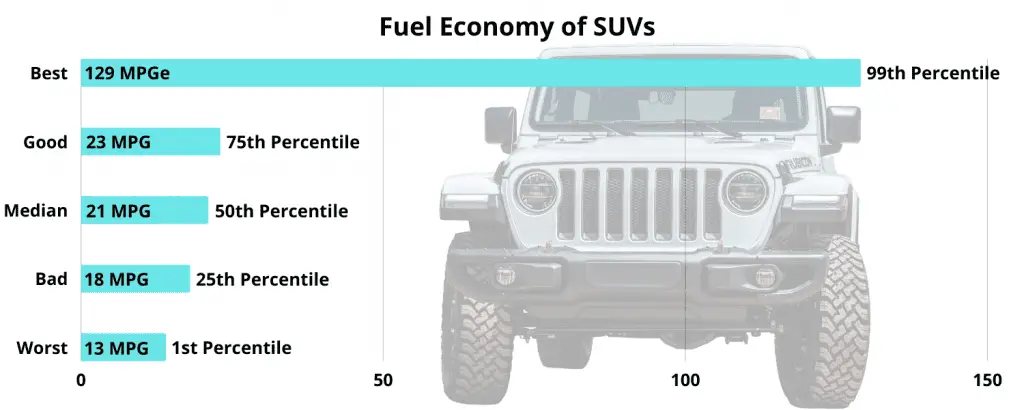
SUV vehicles have an average combined fuel economy of 24.9 miles per gallon (MPG) and a median of 21 MPG. The average SUV is 14% less fuel-efficient than the average automobile, which gets 29.1 MPG. The median SUV gets 2 miles per gallon less than the median automobile, which gets 23 MPG.
There is a large MPG(e) gap between electric and gas-powered SUVs, which skews the average. In fact, more than 75% of SUVs have lower gas mileage than the average of 24.9 MPG.
When accounting for both gas and electricity, the median fuel economy, which is 21 miles per gallon, is a much better measure for gauging efficiency.
What is a good fuel economy for an SUV?
The good fuel economy for any given SUV is 23 MPG or higher. This is the 75th percentile, meaning 75% do less than 23 MPG. A normal or acceptable MPG for an SUV is 23–18 MPG (75th–25th percentiles).
A bad MPG for any given SUV would be 18 MPG or lower.
| Percentile | Car | MPG |
| 99th | Tesla Model Y RWD | 129 |
| 75th | Cadillac XT6 FWD 2.0L 4 cyl | 23 |
| Median (50th) | Dodge Durango RWD 3.6L 6 cyl | 21 |
| 25th | Jeep Wagoneer 2WD 5.7L 8 cyl | 18 |
| 1st | Cadillac Escalade V 4WD 6.2L 8 cyl | 13 |
Fuel cost of an SUV
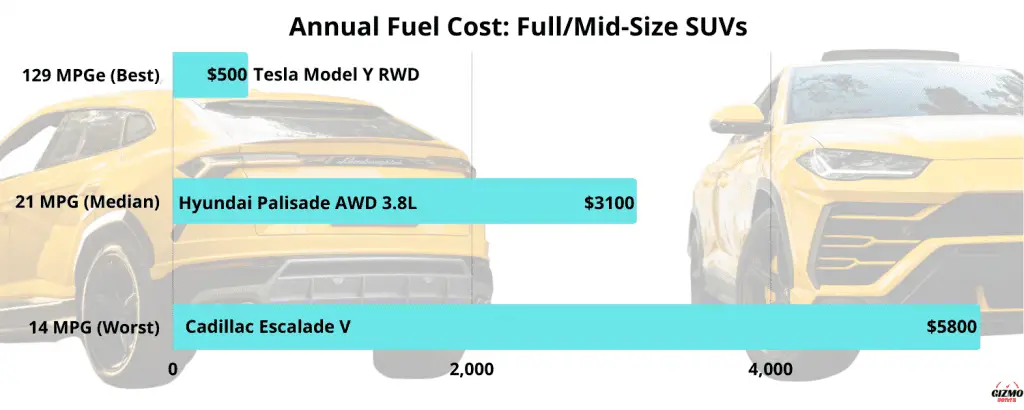
Depending on the price of gas, the average annual fuel cost of an SUV ranges between $2,600 and $3,800. However, at the extremes, SUVs can have an annual fuel cost of $5800 per year or as low as $500 per year.
The median SUV is 9.5% more costly than the median automobile and 33% more than the median sedan.
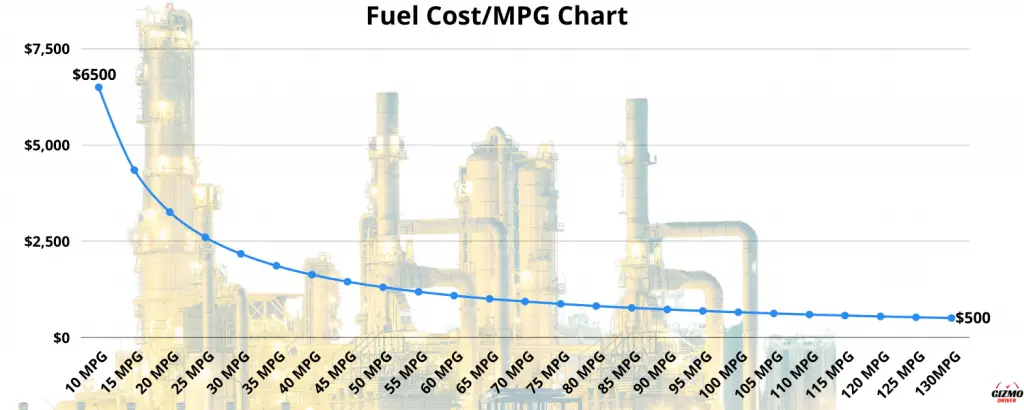
The fuel cost-to-fuel economy ratio is not linear, as shown in this graph. The lowest MPG ranges see the most significant changes in fuel costs.
The cost savings become less significant as you approach the MPG ranges where plug-in hybrids and electric cars operate.
These are very general figures, which don’t take many factors into account, such as engine size, powertrain, and vehicle weight, into account.
In the rest of the article, fuel economy numbers will be given for many of the different groups in a more detailed way.
Fuel Economy by Size – Full-size and Mid-size SUVs
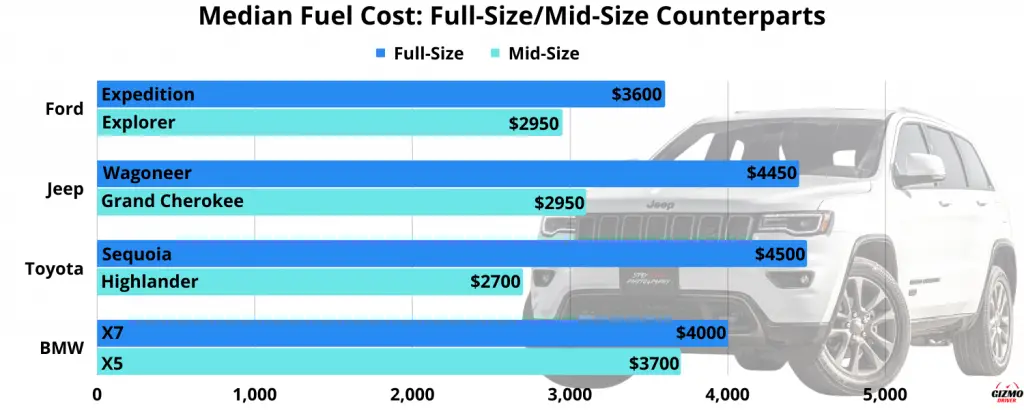
What is the fuel economy of full-size SUVs
The average fuel economy of a full-size SUV is 21.3 MPG. The median is 17 MPG. Full-size SUVs are the least fuel-efficient automobiles, 26% less fuel-efficient than the average vehicle.
Good fuel economy for a full-size SUV:
A good fuel economy for a full-size SUV would be anything above 19 MPG, which is the 75th percentile for the full-size segment. Gas mileage that is between 16-19 MPG is considered normal for a full-size SUV.
Bad fuel economy is within the 25th percentile, which is under 16 MPG.
Most-median-least fuel-efficient full-size SUVs:
| Percentile | Car | MPG |
| 99th | Rivian R1s | 69 |
| 75th | Ford Expedition 2WD 3.5L 6 cyl | 19 |
| Median (50th) | GMC Yukon XL 2WD 5.3L 8 cyl | 17 |
| 25th | Cadillac Escalade 2WD 6.2L 8 cyl | 16 |
| 1st | Cadillac Escalade V 4WD 6.2L 8 cyl | 13 |
What is the fuel economy of mid-size SUVs
Mid-size SUVs have an average and median fuel economy of 25.8 and 21 miles per gallon, respectively. This is much better than full-size SUVs, which, on average, get 4 MPG less. However, mid-size SUVs still fall short compared to all automobiles. The average mid-size SUV is 11% less efficient than the average car.
Good fuel economy for a mid-size SUV:
A good fuel economy for a mid-size SUV is 23 MPG or higher, while a bad one would be anything below 18 MPG. These are the 75th and 25th percentile figures for mid-size SUVs. A fuel economy between these two values, 23 and 18 miles per gallon, is considered normal.
Most-median-least fuel-efficient mid-size SUVs:
| Percentile | Car | MPG |
| 99th | Tesla Model Y RWD | 129 |
| 75th | Nissan Pathfinder 4WD 3.5L 6 cyl | 23 |
| Median (50th) | Range Rover Velar P400 MHEV 3.0L 6 cyl | 21 |
| 25th | Porsche Cayenne S 2.9L 6 cyl | 18 |
| 1st | Bentley Bentayga Speed 6.0L 12 cyl | 14 |
Fuel economy of Luxury SUVs
Luxury SUVs have an average fuel economy of 31.1 MPG and a median fuel economy of 21 MPG. The median MPG for luxury SUVs is less than the median for all vehicles. However, the average is slightly higher.
Luxury vs. standard SUV – fuel economy difference
While the median fuel efficiency is in-line with standard SUVs, the average is more than 5 MPG higher than standard SUVs, which is significant. The reason for this is that most, if not all, electric SUVs are luxury brand vehicles.
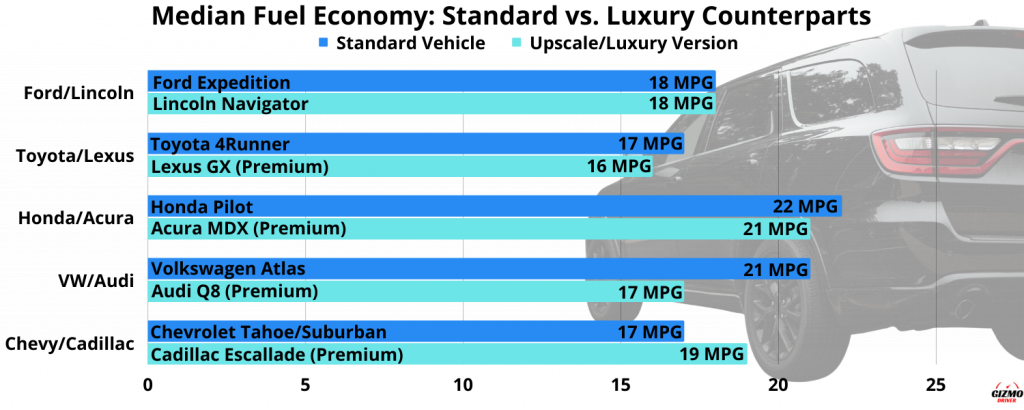
However, when we look at the fuel economy difference between luxury SUVs that share a platform with their standard SUV counterparts, we see a different story.
Non-electric luxury SUVs are, on average, 1 MPG less fuel-efficient than their standard SUV counterparts.
Luxury SUVs are typically fitted with larger engines, wheels, premium features, and more technology. All of these factors significantly impact the fuel economy by increasing the weight of the vehicle.
Good fuel economy for a luxury SUV:
Good gas mileage for a luxury SUV would be 23 MPG or higher, which is in the upper percentile (75th+) for luxury SUVs. Anything between 18 and 23 miles per gallon is considered okay. A bad fuel economy would be under 18 MPG, which is the 25th percentile for all luxury SUVs.
Most-median-least fuel-efficient luxury SUVs:
| Percentile | Car | MPG |
| 99th | Tesla Model Y RWD | 129 |
| 75th | Infiniti QX60 FWD 3.5L 6 cyl | 23 |
| Median (50th) | Lincoln Aviator RWD 3.0L 6 cyl | 21 |
| 25th | Maserati Levante GT 3.0L 6 cyl | 18 |
| 1st | Rolls-Royce Cullinan 6.7L 12 cyl | 14 |
Fuel Economy by Powertrain Type – SUVs
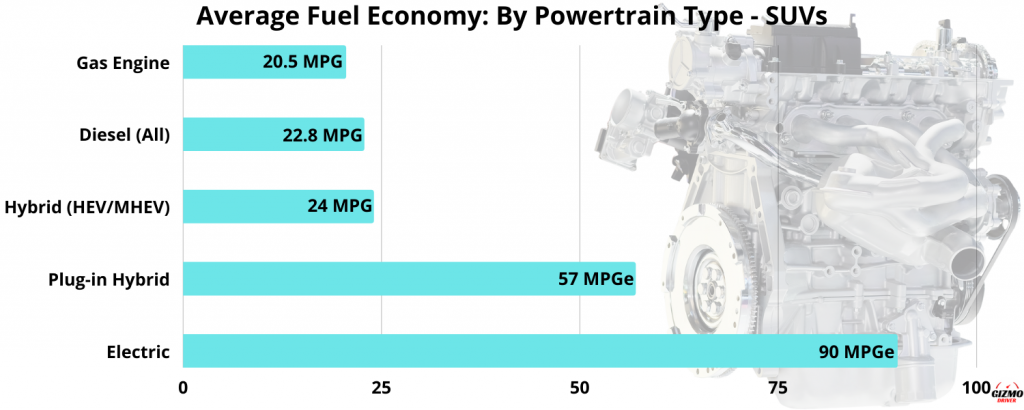
The fuel economy of an SUV is largely dependent on its powertrain. A plug-in hybrid can be 3 times more fuel-efficient than a conventional gasoline car, while an EV can be more than 4 times more efficient!
How engine size and power affect fuel efficiency in SUVs
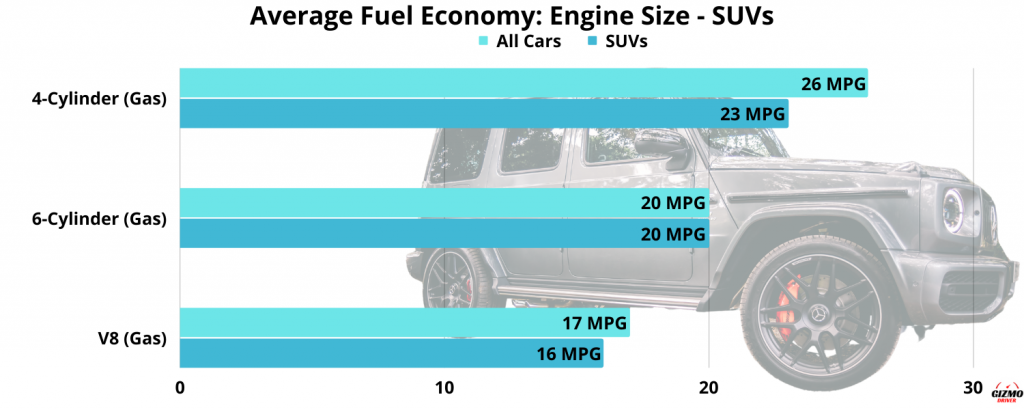
The size of the engine has a significant impact on fuel economy. As seen in the table above, for every two-cylinder increase in a conventional gasoline engine SUV, the fuel economy drops by 3-4 MPG.
How turbos affect the fuel economy
Turbocharging doesn’t directly make your car use less gas, but it does let your engine make more power without using more gas. In turn, turbos indirectly save fuel by letting the engine make the same amount of power with less fuel.
So, manufacturers can put smaller, more fuel-efficient turbocharged engines in cars that would have needed a bigger engine with a naturally aspirated engine to get the same amount of power.
For example, the KIA Sorento LX+ and SX trim both have 2.5L 4-cylinder engines with similar fuel economy, 26 MPG for the LX+ and 25 MPG for the SX. The difference is mainly due to the SX being nearly 200 pounds heavier than the LX.
However, the SX trim has a turbocharger, which produces 90 more horsepower than the non-turbo LX+ trim.
This 50% increase in horsepower but less than a 3% decrease in fuel economy. Consequently, the SX can achieve the same power output as the LX+ at higher fuel efficiency.
3-cylinder gas SUVs
The only SUV fitted with a 3-cylinder engine is the Ford Bronco Sport 4WD 1.5 L, which has an average gas mileage of 24.5 MPG and produces 181 horsepower.
4-cylinder gas SUVs
The average fuel economy for a 4-cylinder SUV is 22.6 MPG and the median is 23 MPG. The median 4-cylinder SUV has just about the same fuel economy as the median automobile.
Good fuel economy for large 4-cylinder SUVs is anything above 24 MPG, which is the 75th percentile for this segment.
Normal gas mileage is between 24 and 22 MPG, while poor mileage is anything less than the 25th percentile, or less than 22 MPG.
At 27 miles per gallon, the Mitsubishi Outlander has the highest MPG among all conventional gasoline SUVs with 4-cylinder engines. Any 4-cylinder SUV with a higher MPG than that is a hybrid (HEV).
| Percentile | Car | MPG |
| 99th | Mitsubishi Outlander 2WD 2.5L 4 cyl | 27 |
| 75th | Alfa Romeo Stelvio AWD 2.0L 4 cyl | 24 |
| Median (50th) | Volkswagen Atlas Cross Sport 2.0L 4 cyl | 23 |
| 25th | Genesis GV80 AWD 2.5L 4 cyl | 22 |
| 1st | Ford Bronco Badlands 4WD 2.3L 4 cyl | 17 |
6-cylinder gas SUVs
An SUV with a 6-cylinder engine does, on average, 20.2 miles per gallon and has a median of 21 MPG. These types of SUVs normally get between 22 and 19 MPG. A good fuel economy would be anything above 22 MPG, which is the 75th percentile.
A bad MPG would be anything below the 25th percentile, which is 19 MPG.
The Toyota Highlander 3.5L is the most fuel-efficient 6-cylinder conventional gasoline SUV. It does 24 MPG combined.
| Percentile | Car | MPG |
| 99th | Toyota Highlander 3.5L 6 cyl | 24 |
| 75th | Jeep Grand Cherokee 4WD 3.6L 6 cyl | 22 |
| Median (50th) | Chevrolet Traverse AWD 3.6L 6 cyl | 20 |
| 25th | Ford Expedition 2WD 3.5L 6 cyl | 19 |
| 1st | Ford Bronco Raptor 4WD 3.0L 6 cyl | 15 |
8-cylinder gas SUVs
With an average fuel economy of 16.2 miles per gallon and a median of 16, 8-cylinder or V8 gas SUVs are some of the least fuel-efficient vehicles you can buy today. The average V8 SUV burns close to double the amount of gas that an average car would, 16.2 MPG vs. 29.1 MPG.
You can typically expect a V8 SUV to do between 17 and 16 miles per gallon, while anything under 16 MPG is considered bad fuel economy for the segment.
The most fuel-efficient V8 non-hybrid gas SUV is the 5.0-liter Land Rover Range Rover Sport, which does 19 MPG.
| Percentile | Car | MPG |
| 99th | Land Rover Range Rover Sport 5.0L 8 cyl | 19 |
| 75th | BMW X6 M50i 4.4L 8 cyl | 17 |
| Median (50th) | Chevrolet Suburban 4WD 5.3L 8 cyl | 16 |
| 25th | Infiniti QX80 2WD 5.6L 8 cyl | 16 |
| 1st | Cadillac Escalade V 4WD 6.2L 8 cyl | 13 |
MPG difference between 4-cylinder and 6-cylinder engines in SUVs
On average, 4-cylinder SUVs get 2.4 MPG more than 6-cylinder SUVs.
This difference is much less pronounced than the difference you would observe in smaller vehicles. The difference in average fuel economy between smaller crossovers with 4-cylinder and 6-cylinder engines is 6.3 miles per gallon.
As vehicles get heavier, their ability to utilize the better fuel economy of smaller engines decreases.
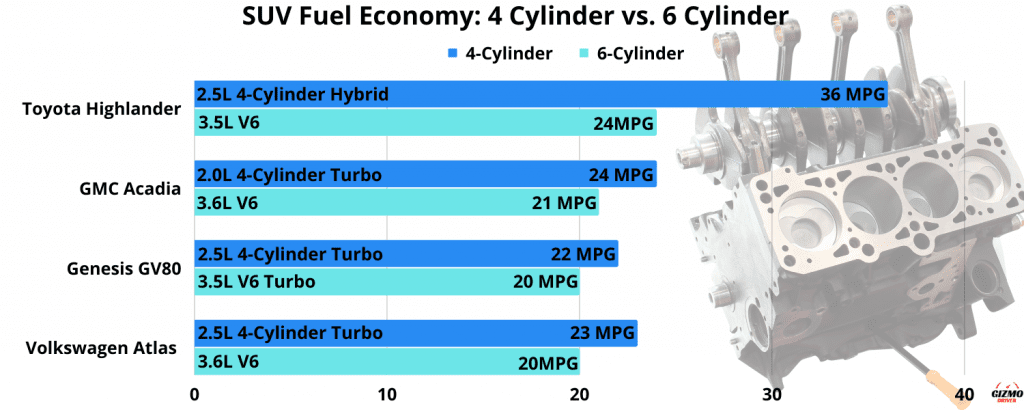
When looking at the same SUVs with 4- and 6-cylinder trims, we can observe the difference in fuel economy is generally between 2-3 miles per gallon, with the 4-cylinder being the better in terms of efficiency.
How drivetrain affects gas mileage – RWD vs. FWD vs. AWD/4WD
Front-wheel drive is generally more fuel-efficient than rear-wheel drive. The median rear-wheel drive vehicle has a fuel economy of 20 MPG while the median front-wheel-drive car has a median fuel economy of 30 MPG.
However, this big difference is mainly due to the fact that most performance cars, which are significantly less fuel-efficient, are rear-wheel drive.
All-wheel drive or 4-wheel drive typically reduces the fuel economy of a front-wheel or rear-wheel car by 3% to 10% or 1-2 MPG for a gas car. The difference is much larger in electric vehicles.
The Efficiency of Hybrid and Electric Powered SUVs
Mild hybrid (MHEV) SUVs
The average fuel economy of SUVs with mild hybrid systems is 20.4 MPG, while the median is 21 MPG. This is quite a low figure. However, most MHEV SUVs are equipped with 6 and 8-cylinder engines, which would have otherwise had a much lower fuel economy.
Most MHEV SUVs do 22–20 MPG. Anything above that range is in the 75th percentile and is considered great fuel economy. Anything below 20 MPG is considered inefficient.
The most fuel-efficient MHEV SUV is the 6-cylinder BMW X5 sDrive40i, which gets 23 MPG.
| Percentile | Car | MPG |
| 99th | BMW X5 sDrive40i 3.0L 6 cyl | 23 |
| 75th | Mercedes-Benz GLE450 4matic 3.0L 6 cyl | 22 |
| Median (50th) | Land Rover New Range Rover P360 MHEV 3.0L 6 cyl | 21 |
| 25th | Audi Q7 Quattro 3.0L 6 cyl | 20 |
| 1st | Audi RS Q8 4.0L V8 | 15 |
Full Hybrid SUVs (HEV)
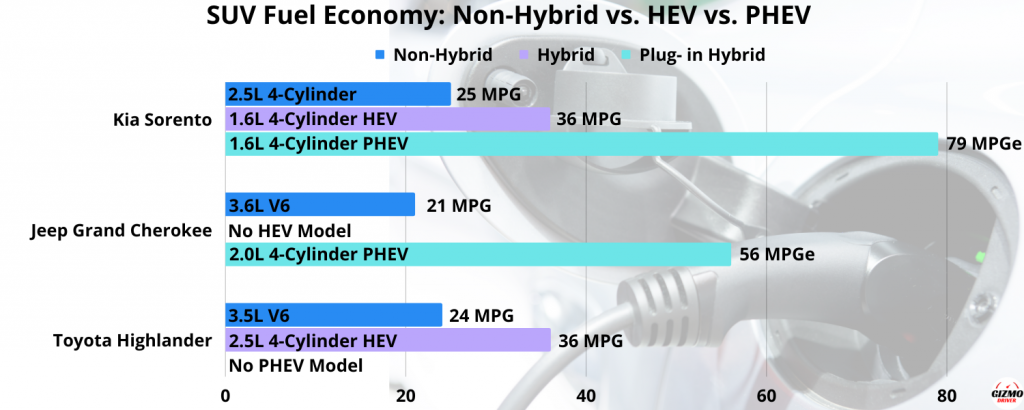
The average large hybrid SUV does 31.6 MPG and the median does 33 MPG. This is 8.6% more fuel-efficient than the average car, but less than 78% as efficient as the average hybrid car.
Good fuel economy for a hybrid SUV is 35 MPG or higher, while anything between 35 and 27 MPG is considered average. A bad fuel economy would be anything under 27 MPG.
The Toyota Venza is the most fuel-efficient hybrid mid-size SUV. It does 39 miles per gallon.
| Percentile | Car | MPG |
| 99th | Toyota Venza AWD 2.5L 4 cyl | 39 |
| 75th | Toyota Highlander Hybrid AWD LTD/PLAT 2.5L 4 cyl, | 35 |
| Median (50th) | Hyundai Santa Fe Hybrid Blue1.6L 4 cyl | 33 |
| 25th | Ford Explorer HEV RWD 3.3L 6 cyl | 27 |
| 1st | Ford Explorer Platinum HEV AWD 3.3L 6 cyl | 23 |
Plug-in hybrid SUVs
Plug-in hybrid SUVs have an average and median fuel economy of 57.6 MPG and 55 MPG, respectively. Anything between 66 and 49 MPG is considered to be normal.
A good MPG for a PHEV SUV is 66 MPG+, while anything below 49 MPG is considered bad.
| Percentile | Car | MPGe |
| 99th | Kia Sorento Plug-in Hybrid 1.6L 4 cyl | 79 |
| 75th | Volvo XC90 T8 AWD Recharge ext. Range 2.0L 4 cyl | 66 |
| Median (50th) | Volvo XC90 T8 AWD Recharge 2.0L 4 cyl | 55 |
| 25th | Jeep Wrangler 4dr 4xe 2.0L 4 cyl | 49 |
| 1st | Land Rover Range Rover Sport PHEV 2.0L 4 cyl | 42 |
The efficiency of EV SUVs
While PHEVs may be the most efficient gasoline vehicles, EVs are the most efficient vehicles in general.
The average efficiency of a fully electric SUV is 90.1 MPGe, or 37.5 kWh/100mi, and the median is 86 MPGe, or 39 kWh/100mi.
The most efficient electric SUV is the Tesla Model Y, which does 129 MPGe, or 26 kWh/100mi in its most efficient trim.
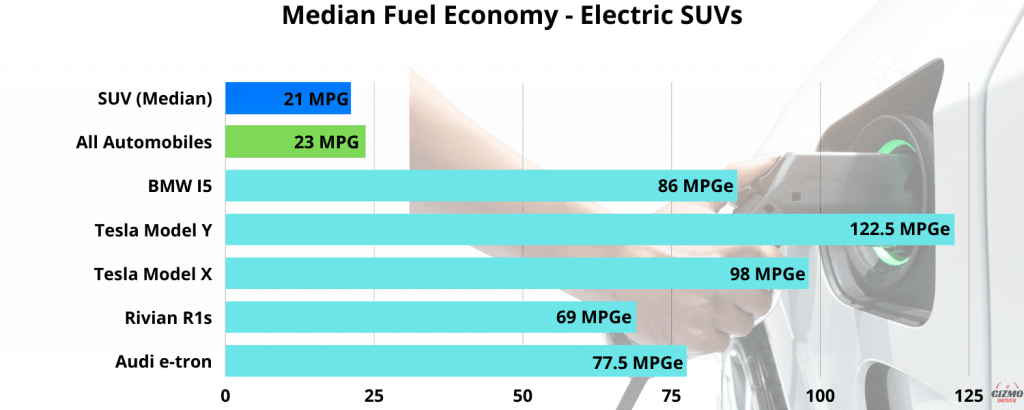
| Percentile | Car | MPGe |
| 99th | Tesla Model Y RWD | 129 |
| 75th | Tesla Model X | 102 |
| Median (50th) | BMW iX xDrive50 20in Wheels | 86 |
| 25th | Audi e-tron S 20in wheels | 73 |
| 1st | Audi e-tron S 22in wheels | 63 |
Fuel Economy of SUVs vs. Other Automobiles
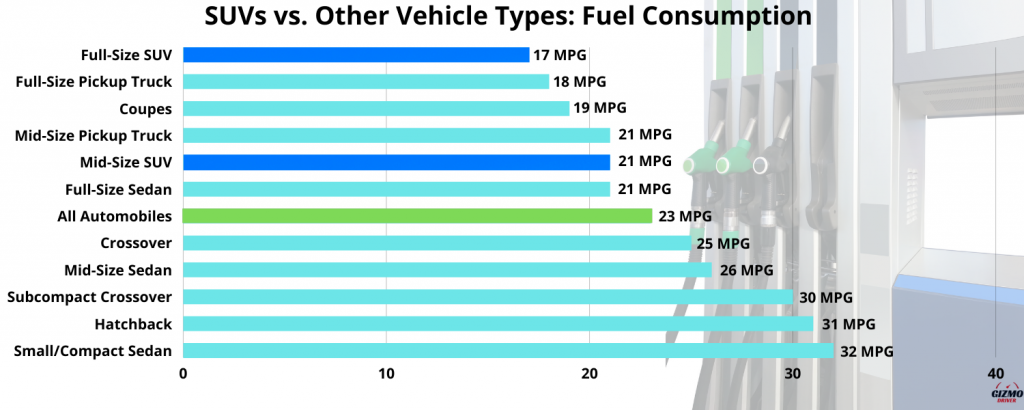
SUVs rank in the bottom half of vehicles in terms of fuel economy, while full-size SUVs are outright the worst gas mileage vehicles of all automobile categories, even beating out full-size pick-up trucks.
Why are SUVs less fuel-efficient than other types of automobiles?
The main reason SUVs are less efficient than other vehicle types is mainly weight. SUVs are the heaviest type of automobile. Heavier vehicles require more powerful engines, which reduce the fuel economy.
Mid-size SUVs vs. Crossovers (Compact SUVs)
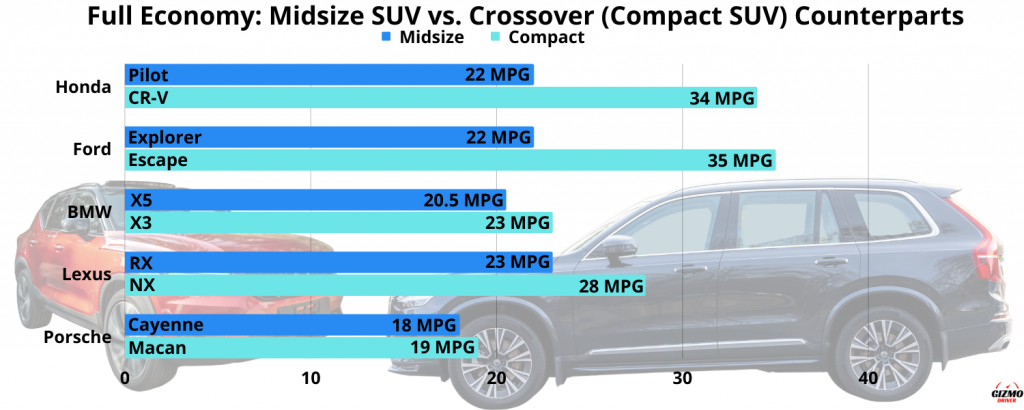
Crossovers are 32% more fuel-efficient. The average fuel economy for a compact/subcompact crossover is 32.8 MPG, while the average for a large SUV is 24.9 MPG.
Compact crossover SUVs are typically 5–10 MPG more fuel-efficient than the same brand’s mid-size SUV counterparts. Even though they share many of the same platforms, the difference in fuel economy is primarily attributable to weight.
See our article about the average MPG for crossovers here.
SUVs vs Sedans
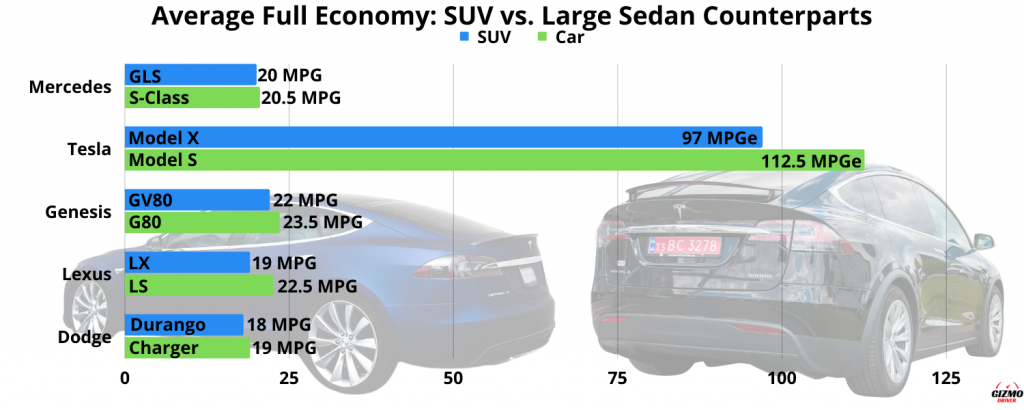
The average fuel economy for a full-size/mid-size SUV is 24.9 MPG, while the average for a sedan is 36.8 MPG.
Despite the significant difference in fuel efficiency between the two vehicle classes, the median fuel efficiency of larger full-size sedans and SUVs (both mid-size and full-size) is the same: 21 MPG.
Full-size sedans are marginally more fuel-efficient than SUVs of the same brand. Even though they share many of the same platforms, weight is the main reason for the difference in fuel economy.
See our article about the average MPG for sedans here.
SUVs vs Pick-up Trucks
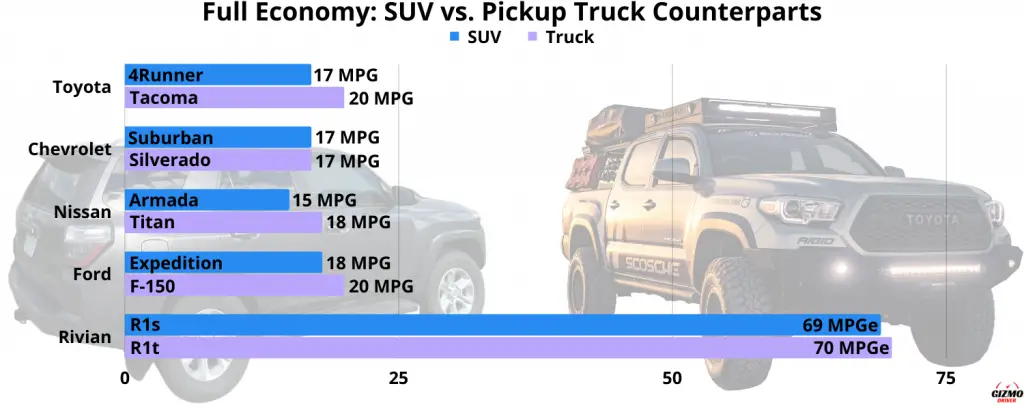
The average fuel economy for a pick-up truck is lower than that of full-size and mid-size SUVs, at 20.7 MPG compared to 24.9 MPG. However, that takes large crossovers, which are classified as mid-size SUVs, into account. When only accounting for SUVs built on a pick-up truck platform, SUVs are less fuel-efficient.
As we can see in the chart above, pick-up trucks are nearly always more fuel-efficient than their SUV counterparts, which use the same platform.
SUVs tend to be 5 to 10 percent heavier than pick-up trucks because they have a whole extra cabin in the back, which is why they are less fuel-efficient.
See our article about the average MPG for pickup trucks here.

